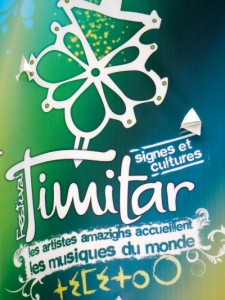The Timitar Festival is held annually in Agadir, Morocco typically during the month of June or July. The 8th Edition of the Timitar Festival held this June 22nd – 25th, 2011 was the perfect morocco travel opportunity for those wanting to escape seaside as Timitar featured some of Morocco’s most admired artists, Hamid Inerzaf, Rayssa Naima, Rayssa Kabira, Bderrahim Souiri, Funk Atlas, Imazzalen, Ahwach Foum Lacen and Daoudia. Timitar also showcased International artists alongside its wide range of Moroccan musicians such as Lebanese superstar Najwa Karam, Malian greats Amadou & Mariam, Goran Bregovic from Serbia and Registan from Uzbekistan. Each stage at the Timitar Festival was filled to the rim with people and filed in as having excellent weather.



